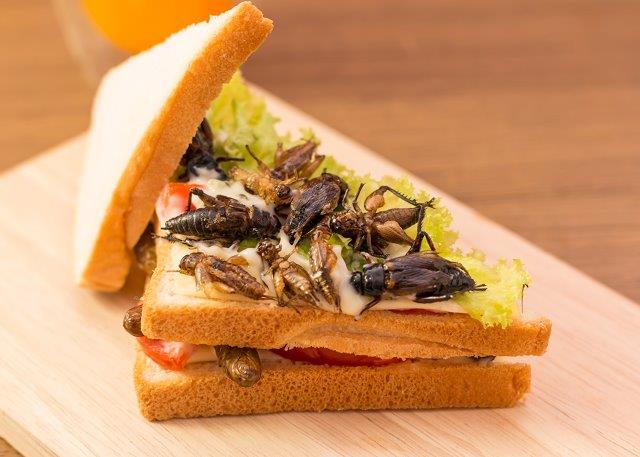
Ag, Food Security Enable National Security

protein deficiency. Cheesebugger, anyone?
-- Shutterstock
Why is the U.S. Department of Defense Advanced Research Projects Agency (DARPA) interested in agriculture?
Blake Bextine, Ph.D., a DARPA researcher, answered that question via a phone interview at the North Carolina Biotechnology Center’s Crop, Animal, and Food Tech Showcase at the Cotton Room in downtown Durham.
“Our food security and agriculture security are of paramount importance to the stability of our country and our economy,” he said. Bextine, an entomologist working in Arlington, Va., as program manager of DARPA’s ag biosecurity program, spoke via phone because his duties prevented him from attending the Showcase in person.
Bextine presented the opening keynote at the Showcase, which brings together ag tech investment firms, global ag tech companies and other key industry stakeholders for information sharing, networking and partnering. Twelve ag tech startups from several states and South Africa vied for a $10,000 prize determined by audience voting, to be awarded the second day of the two-day Showcase.
Adding insects to injury
Bextine said DARPA, started in 1958 in response to the Soviet launch of Sputnik, the first artificial satellite, is intended to prevent technological surprises such as that by keeping the U.S. on the leading edge of technology advances. “Out of that came many good things,” he said.
Those include the GPS system small enough to fit on a chip on a cell phone and the Internet, among others. “We’re doing Department of Defense work that flows into the private sector,” he said.
Bextine described several projects he is working on as a project manager for DARPA. They include “Insect Allies,” which he called “A flexible and rapidly deployable platform for modification of mature plants at scale.”
DARPA proposes to leverage a natural and efficient two-step delivery system to transfer modified genes to plants: insect vectors and the plant viruses they transmit. In the process, DARPA aims to transform certain insect pests into “Insect Allies,” the name of the new effort.
Natural protections, serious "lights out"
DARPA plans to harness the power of this natural system by engineering genes inside plant viruses that can be transmitted by insects to confer protective traits to the target plants they feed upon.
Applications include introducing new plant characteristics to respond to changing environments and protect plants from pests and pathogen incursions, he said.
The project ensures biosafety and biosecurity by conducting the work in closed laboratories and greenhouses. In addition, the plan is to install “longevity” safeguards such as light sensitivity into the insects. Insects would be reared in light for their entire lives so that when the light goes away “Mortality kicks in,” said Bextine. “You introduce them in the morning and when the sun goes down, they die.”
The technology’s role in national security would be to protect agriculture from bio-threats and stabilize food supplies in unstable regions. “Its impact may shift the plant protection paradigm and accelerate agricultural innovation,” Bextine said.
Another DARPA project is exploring the use of plants for sensing biosecurity threats. “What if we could ask plants to tell us much more about their environment,” Bextine asked.
Bextine also described a federal Small Business Innovation Research (SBIR) program that is exploring the use of insects as food. Bextine once appeared on the TV reality show, Tethered, where he ate maggots. He said the SBIR project is looking at using molecular technology to breed insects with higher nutritional value. Instead of golden rice, he suggested, imagine “golden maggots.”
Bextine also noted that DARPA is “always looking for great ideas.” They must have some application to defense or national security, but many also have private-sector applications.
He outlined ways to interact with DARPA, which include talking to a program manager via email, phone, or face-to-face. Ideas can also be submitted to an office-wide Broad Agency Announcement, “where we fund seedlings and take ideas from disbelief to mere doubt,” he said.
He did caution that it’s a good idea to see if an idea has legs. “We have to mesh national security into any projects we want to accomplish. We make sure that at the end of a project or program, we have a capability we didn’t have before.”
